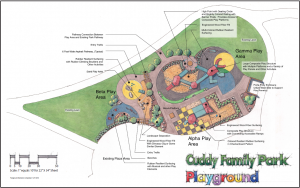Among the propostitions on the Anchorage municipal election ballot April 3rd, is one that means a lot to one little girl. Her name is Anna and she likes to go to the park. KSKA’s Daysha Eaton explains how Proposition 3 could give her a place to play.
“My name is Anna and I’m 5 (and where do you live, where are you from?) … um Anchorage.”
 That’s Anna Boltz, a 5-year old with big blue eyes and blond curls. Like most kids her age, she loves to play. And among her favorite places is the park. But unlike most kids, Anna can’t play just anywhere. Her mom Leah explains.
That’s Anna Boltz, a 5-year old with big blue eyes and blond curls. Like most kids her age, she loves to play. And among her favorite places is the park. But unlike most kids, Anna can’t play just anywhere. Her mom Leah explains.
“Anna has spina bifida, which is a birth defect where the spine does not completely close around the spinal column and a section of the spinal column is outside of the body when their born. She is paralyzed from the knees down. She can walk with the assistance of a walker … for longer distances we use the wheel chair.”
“We’re just gettin’ in the wheelchair … and um this is pretty much what we do every time we come here. Luckily today there’s a path plowed out, so let’s go walk down here(anna: okay),” Anna’s mom said.
Anna’s mom Leah Boltz pushes her wheel chair down the snowy path at Cuddy Park, just beside the Loussac Library in Midtown. Leah has been working on the ‘Parks for All’ campaign since 2009 to bring a playground for kids of all abilities to Anchorage. Right now there is no fully accessible playground in the city. But Leah is hoping there will soon be one at Cuddy. She points to an area that’s covered with snow.
“This area that we’re walking by right here on the right, this is where the playground is supposed to be,” she said.
Underneath is an area of grass, rocks and shrubs What Leah would like to see is.
“Playground equipment and surfacing that allows for children of any disability to be able to access it.”
That means rubberized surfacing that wheelchairs can go on. And ramps.
“Access to the top of the equipment is a big thing. We go the playground now and I lift her up on the slide and she comes down … until I can’t do it any more (laughs). So this would bring us some ramps up to the top of the equipment where she would be able to wheel up to the top of the equipment on her own and then slide down.”
Mayor Dan Sullivan has endorsed the idea and set aside some funding. Leah and other mothers have also raised a substantial portion of the necessary funds. The remaining $100,000 in funding for the Playground is bundled into Proposition 3, the parks and recreation bond on the upcoming municipal election ballot.
“For little kids, really how they learn is through play.”
That’s Amy Simpson, the executive Director of the infant learning program in Anchorage. She says little kids with disabilities need a place to learn movement and interact with other kids.
“But I also think that it’s important for children without disabilities, or who may be on a more typical developmental trajectory, that they have experience with individuals who are different than them … because that’s what builds compassion in our community.”
For Anna, the reasoning is much more simple.
“I like the playgrounds … and I really like the see-saw.”
If Proposition 3 passes, Anna and an estimated $8,500 other kids with disabilities in Anchorage could finally have a place to play.
Daysha Eaton is a contributor with the Alaska Public Radio Network.
Daysha Eaton holds a B.A. from Evergreen State College, and a M.A. from the University of Southern California. Daysha got her start in radio at Seattle public radio stations, KPLU and KUOW. Before coming to KBBI, she was the News Director at KYUK in Bethel. She has also worked as the Southcentral Reporter for KSKA in Anchorage.
Daysha's work has appeared on NPR's "Morning Edition" and "All Things Considered", PRI's "The World" and "National Native News". She's happy to take assignments, and to get news tips, which are best sent via email.
Daysha became a journalist because she believes in the power of storytelling. Stories connect us and they help us make sense of our world. They shed light on injustice and they comfort us in troubled times. She got into public broadcasting because it seems to fulfill the intention of the 4th Estate and to most effectively apply the freedom of the press granted to us through the Constitution. She feels that public radio has a special way of moving people emotionally through sound, taking them to remote places, introducing them to people they would not otherwise meet and compelling them to think about issues they might ordinarily overlook.




